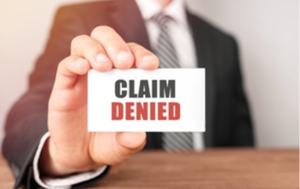“Please accept this letter as a formal denial of coverage.”
This dreaded language is often found in a denial of coverage letter issued by an insurance company. You have been involved in a car accident, you’re injured, and the last thing you need is a letter from the insurance company denying coverage.

Perhaps the letter is from a relative’s auto insurance company that you thought you were covered under, the insurance policy on the vehicle you were a passenger in, or maybe even your own auto insurance – the one you have been paying the premium on for years.
In these cases, a declaratory judgment action may be just what you need to fight back against the insurance company and resolve the coverage dispute in your favor.
What is a declaratory judgment action?
Generally, a declaratory judgment action is used to define the legal relationship and obligations between two parties. In Virginia, declaratory judgment actions are filed in circuit court.
However, federal law also provides a mechanism for litigants to seek declaratory relief under Fed. R. Civ. P. 57. In both cases, a declaratory judgment can be used to resolve questions about the construction of terms and obligations arising under insurance contracts.
For example, a declaratory judgment action can be used to determine:
- whether coverage existed at all,
- the amount of coverage an injured plaintiff is entitled to, and
- the order of priority between several applicable insurance policies.

Why do insurance companies deny coverage?
There are a number of reasons why an insurance company may deny your claim:
- Liability is in dispute
- You were not a “named insured” on the policy
- The insurance company claims that you did not have permission to drive the vehicle you were “us[ing]” at the time of the accident
- Because they claim you were partially or wholly at fault for the accident.
Many issues in this area of the law arise in the context of uninsured and underinsured motorist coverage, which is governed by Va. Code § 38.2-2206. In any case, Virginia law has prescribed the filing of a declaratory judgment action as a helpful procedure for resolving questions about the obligations of an insurance company. In the face of a dreaded denial of coverage letter, claimants have the option to file a declaratory judgment action to resolve coverage disputes.

How can filing a declaratory judgment action help?
At the outset, it is important to understand that an action for declaratory judgment is fundamentally different from an underlying personal injury claim. An action for declaratory judgment seeks to have the court “declare” the rights of the parties before the court.
On the other hand, a personal injury lawsuit seeks a monetary award for the plaintiff. In our cases, the goal is always to ensure that a plaintiff is fully and fairly compensated for the damages they have sustained as a result of the defendant’s negligence.
However, in some cases, it may be necessary to file a declaratory judgment action first, before your personal injury claim is filed. In other cases, a declaratory judgment action may need to be filed during the pendency of your underlying personal injury lawsuit, depending on the specific facts of your case.
The goal in these cases is to have the court “declare” that the plaintiff is, for example, covered under an applicable insurance policy. Then, this declaration of rights – in the form of a court order – can be used to succeed in an underlying claim for personal injuries.
Overall, an action for declaratory judgment is a useful tool that can help injured plaintiffs fight a denial of coverage from an insurance company. It can also routinely help plaintiffs that pursue additional coverage in the case of an underinsured motorist.
The experienced personal injury attorneys at Allen and Allen can help determine whether a declaratory judgment action is right for your case. And if you have been injured in an accident through no fault of your own, you may be entitled to compensation. Call Allen & Allen today for a free consultation at 866-388-1307.


